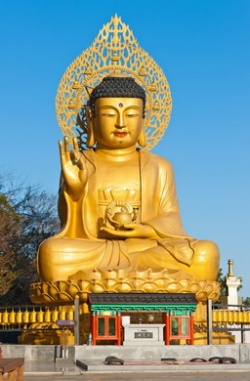Bhaddiya
Bhaddiya: 1. Bhaddiya Thera. An anāgāmī, one of seven persons who became Arahants as soon as they were born in Avihā. S.i.35, 60; ThigA. 222, etc.
2. Bhaddiya Thera. Called Kāligodhāputta, chief among monks of aristocratic birth (uccakulikānam) (A.i.23). He belonged to a family of the Sākiyan rājas of Kapilavatthu and entered the Order in the Anupiya Mango grove with Anuruddha and the others, soon afterwards attaining to arahantship. Dwelling in the bliss of Nibbāna, under a tree in
a lonely spot, Bhaddiya used to exclaim "Aho sukham, aho sukham." When this was reported to The Buddha, he questioned Bhaddiya, who answered that when he was ruling his principality he was well protected, yet was ever fearful and nervous, whereas
now, having renounced all, he was free from all fear (Thag.vss.842-65; UdA.ii.10; Vin.i.183f.; J.i.140). This incident was the occasion for the preaching of the Sukhavihārī Jātaka.
Bhaddiya was the son of Kāligodhā, the senior Sākiyan lady of her time. For five hundred births Bhaddiya had been king, hence his eminence in this Life, though there were others more aristocratic (AA.i.109). His resolve to gain
this distinction was formed in the time of Padumuttara Buddha, when he was born in a very rich family and did various good deeds towards that end.
In the interval between Kassapa Buddha and Gotama Buddha, he was a Householder of Benares and, discovering that Pacceka Buddhas took their meals on the banks of the Ganges, placed seven stone planks for them to sit on (ThagA.ii.55f.; Ap.i.95f). When Bhaddiya was ruling his Sākiyan principality he had as general Sona Potiriyaputta, who later joined the Order (ThagA.i.316).
Anuruddha was Bhaddiya's great friend, and when Anuruddha wished to renounce the world, his mother agreed only on condition that Bhaddiya should accompany him, hoping, in this way, to hold him back. But Anuruddha overcame all Bhaddiya's objections and persuaded him to renounce the Household life within a week.
It is said (Vin.ii.182f) that Bhaddiya attained arahantship in the first rainy season after his ordination.
3. Bhaddiya. A city in the Anga kingdom (DhA.i.384; also iii.363).
The Buddha visited there several times and stayed sometimes at the Jātiyāvana where Mendaka, who lived there, came to see him (Vin.ii.242; DhA.iii.363; also A.iii.36).
It was there that the precept was laid down forbidding monks to wear sandals. Vin.i.190; DhA.iii.451f.; also another ruling re the Pārājikā (Vin.iii.37f).
Bhaddiya was also the residence of Bhaddaji Thera and Visākhā. v.l. Bhaddika.
J.ii.331, etc.; Dvy.123ff calls it Bhadrankara.
4. Bhaddiya. A setthi, father of Bhaddaji Thera.
5. Bhaddiya. See Lakuntaka Bhaddiya.
6. Bhaddiya. One of the four chief merchants of Ekarāja, king of Pupphavatī (Benares). J.vi.135.
7. Bhaddiya. A Licchavi who visited The Buddha at the Kūtāgārasālā and asked if it were true that The Buddha was a magician who, by a glamorous trick, enticed away the followers of others. The Buddha advised Bhaddiya not to be led away by hearsay but to judge for himself; and he then proceeded, by means of question and answer, to convince Bhaddiya that his teachings were truly founded on fact and, if accepted and practised, would benefit not only human beings but the very trees of the forest (A.ii.190ff).
The Commentary adds (AA.ii.558) that, at the conclusion of the discourse, Bhaddiya became a Sotāpanna.
